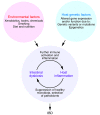The microbial basis of inflammatory bowel diseases
- PMID: 25083986
- PMCID: PMC4191005
- DOI: 10.1172/JCI72330
The microbial basis of inflammatory bowel diseases
Abstract
Inflammatory bowel diseases (IBD) are chronic, progressive diseases characterized by aberrant immune responses to environmental and gut microbial triggers in genetically susceptible hosts. Clinical, genetic, and experimental data support the role of gut microbes in causing and sustaining these diseases. Our understanding of IBD has changed dramatically as the result of advances in cultivation-independent approaches and computational platforms for the analysis of large data sets. However, investigations relevant to clinical observations and the natural history of the diseases will be essential for the development of microbial, genetic, and biological metrics that may be used to individualize assessment of risk and improve clinical outcomes in IBD.
Figures


References
-
- Dalziel TK. Chronic interstitial enteritis. Br Med J [Clin Res]. 1913;2:1068–1070.
Publication types
MeSH terms
Grants and funding
LinkOut - more resources
Full Text Sources
Other Literature Sources
Medical

